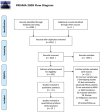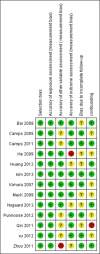Prognostic value of EGFR and KRAS in circulating tumor DNA in patients with advanced non-small cell lung cancer: a systematic review and meta-analysis
- PMID: 28430611
- PMCID: PMC5464923
- DOI: 10.18632/oncotarget.15412
Prognostic value of EGFR and KRAS in circulating tumor DNA in patients with advanced non-small cell lung cancer: a systematic review and meta-analysis
Abstract
EGFR (exon 19 and exon 21) mutations in patients with advanced non-small cell lung cancer (NSCLC) treated by EGFR-TKIs are associated with a better survival; while KRAS mutations predict a worse prognosis. However, there are divergent findings regarding the prognostic value of EGFR and KRAS mutations in circulating tumor DNA (ctDNA). We aimed to summarize the evidence for the use of circulating EGFR and KRAS mutations as prognostic factors in advanced NSCLC patients.We searched the network databases for studies reporting progression-free survival (PFS) and overall survival (OS) stratified by EGFR or KRAS mutations in ctDNA in advanced NSCLC patients. Thirteen studies enrolling 2,293 patients were reviewed. Correlation of circulating EGFR or KRAS mutations with patients' prognosis was assessed by meta-analysis.The pooled analyses showed that EGFR mutations in ctDNA significantly prolong PFS (HR=0.64,95% CI 0.51-0.81, I2=0%, p=0.0002), namely, in patients treated by EGFR-TKIs. There is a trend to have a prolonged OS for advanced NSCLC patients with circulating EGFR mutations who were treated by EGFR-TKIs (HR=0.79, 95% CI 0.52-1.21, I2=0, p=0.28). KRAS mutations detected in ctDNA predict a worse PFS (HR=1.83, 95% CI 1.40-2.40, p<0.0001) and OS (HR=2.07, 95% CI 1.54-2.78, p<0.00001) in advanced NSCLC patients treated by chemotherapy. Sensitivity analyses and subgroup analyses demonstrated the stability of our conclusion.Our analysis showed that EGFR mutations in ctDNA predicted a better PFS, in particular in advanced NSCLC patients treated by EGFR-TKIs. KRAS mutations in ctDNA indicated a worse PFS and OS in patients treated by chemotherapy.
Keywords: EGFR; KRAS; NSCLC; meta-analysis; prognosis.
Conflict of interest statement
The authors declare that they have no competing interest.
Figures






Similar articles
-
Should KRAS mutation still be used as a routine predictor of response to EGFR-TKIs in advanced non-small-cell lung cancer? A revaluation based on meta-analysis.J Cancer Res Clin Oncol. 2015 Aug;141(8):1427-39. doi: 10.1007/s00432-015-1910-9. Epub 2015 Jan 11. J Cancer Res Clin Oncol. 2015. PMID: 25577224 Free PMC article.
-
Afatinib in the treatment of EGFR mutation-positive NSCLC--a network meta-analysis.Lung Cancer. 2014 Aug;85(2):230-8. doi: 10.1016/j.lungcan.2014.05.007. Epub 2014 May 21. Lung Cancer. 2014. PMID: 24929780
-
Front-line therapy for brain metastases and non-brain metastases in advanced epidermal growth factor receptor-mutated non-small cell lung cancer: a network meta-analysis.Chin Med J (Engl). 2023 Nov 5;136(21):2551-2561. doi: 10.1097/CM9.0000000000002468. Chin Med J (Engl). 2023. PMID: 37160733 Free PMC article.
-
Genomic profiling and prognostic factors of leptomeningeal metastasis in EGFR-mutant NSCLC after resistant to third-generation EGFR-tyrosine kinase inhibitors.Lung Cancer. 2025 Jul;205:108593. doi: 10.1016/j.lungcan.2025.108593. Epub 2025 May 26. Lung Cancer. 2025. PMID: 40543420
-
Assessment of somatic k-RAS mutations as a mechanism associated with resistance to EGFR-targeted agents: a systematic review and meta-analysis of studies in advanced non-small-cell lung cancer and metastatic colorectal cancer.Lancet Oncol. 2008 Oct;9(10):962-72. doi: 10.1016/S1470-2045(08)70206-7. Epub 2008 Sep 17. Lancet Oncol. 2008. PMID: 18804418
Cited by
-
A Critical Review of the Prognostic and Predictive Implications of KRAS and STK11 Mutations and Co-Mutations in Metastatic Non-Small Lung Cancer.J Pers Med. 2023 Jun 18;13(6):1010. doi: 10.3390/jpm13061010. J Pers Med. 2023. PMID: 37373999 Free PMC article. Review.
-
Adagrasib in KRYSTAL-12 has Not Broken the KRAS G12C Enigma Code of the Unspoken 6-Month PFS Barrier in NSCLC.Lung Cancer (Auckl). 2024 Dec 17;15:169-176. doi: 10.2147/LCTT.S492126. eCollection 2024. Lung Cancer (Auckl). 2024. PMID: 39717628 Free PMC article.
-
Establishment of lung cancer patient-derived xenograft models and primary cell lines for lung cancer study.J Transl Med. 2018 May 22;16(1):138. doi: 10.1186/s12967-018-1516-5. J Transl Med. 2018. PMID: 29788985 Free PMC article.
-
Circulating Tumor DNA as a Prognostic Determinant in Small Cell Lung Cancer Patients Receiving Atezolizumab.J Clin Med. 2020 Nov 27;9(12):3861. doi: 10.3390/jcm9123861. J Clin Med. 2020. PMID: 33261056 Free PMC article.
-
Prognostic Characteristics and Immunotherapy Response of Patients With Nonsquamous NSCLC With Kras Mutation in East Asian Populations: A Single-Center Cohort Study in Taiwan.JTO Clin Res Rep. 2020 Dec 26;2(2):100140. doi: 10.1016/j.jtocrr.2020.100140. eCollection 2021 Feb. JTO Clin Res Rep. 2020. PMID: 34589991 Free PMC article.
References
-
- Paez JG, Jänne PA, Lee JC, Tracy S, Greulich H, Gabriel S, Herman P, Kaye FJ, Lindeman N, Boggon TJ. EGFR mutations in lung cancer: correlation with clinical response to gefitinib therapy. Science. 2004;304:1497–1500. - PubMed
-
- Pao W, Girard N. New driver mutations in non-small-cell lung cancer. The lancet oncology. 2011;12:175–180. - PubMed
-
- Nygaard AD, Spindler KLG, Pallisgaard N, Andersen RF, Jakobsen A. The prognostic value of KRAS mutated plasma DNA in advanced non-small cell lung cancer. Lung Cancer. 2013;79:312–317. - PubMed
-
- Barlesi F, Mazieres J, Merlio JP, Debieuvre D, Mosser J, Léna H, Ouafik LH, Besse B, Rouquette I, Westeel V. Routine molecular profiling of patients with advanced non-small-cell lung cancer: results of a 1-year nationwide programme of the French Cooperative Thoracic Intergroup (IFCT) The Lancet. 2016;387:1415–1426. - PubMed
Publication types
MeSH terms
Substances
LinkOut - more resources
Full Text Sources
Other Literature Sources
Medical
Research Materials
Miscellaneous

